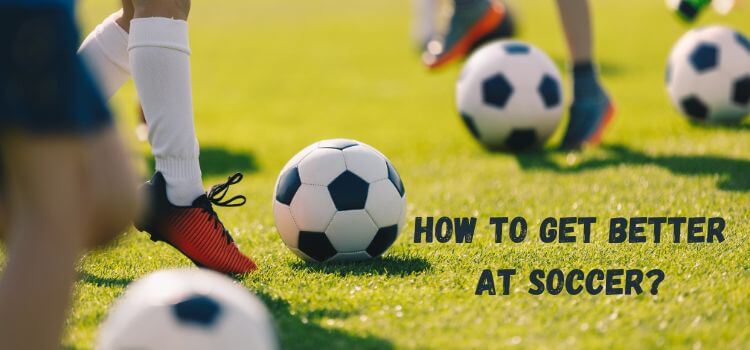As an Amazon Associate, I earn from qualifying purchases
Soccer is more than just a game; it’s a way of life for many enthusiasts worldwide. Whether you are a beginner or looking to sharpen your skills, getting great at soccer requires dedication, strategy, and a passion for the sport. This in-depth manual will lead you through the crucial tactics needed to improve your performance and become a great soccer player.

Understanding the Basics
The Importance of Fundamental Skills
To excel in soccer, mastering the basic skills is crucial. These include dribbling, passing, shooting, and ball control. Focusing on these foundational skills will provide a solid base for more advanced techniques.
Soccer Rules and Regulations
Knowing the rules and regulations of soccer is fundamental. Understanding offside rules, fouls, and the game’s basic structure helps you play smarter and avoid unnecessary penalties.
Physical Fitness and Conditioning
Building Endurance
Soccer is an intensely physical sport that calls for a lot of endurance. Incorporate running, interval training, and aerobic exercises into your routine to boost your stamina.
Strength Training
Soccer players need strength training to increase their power and reduce their chance of injury. Focus on exercises that enhance core strength, leg muscles, and overall body conditioning.
Agility and Speed Drills
Agility and speed are critical for quick movements on the field: practice ladder drills, cone drills, and plyometric exercises to enhance quickness and coordination.
Mastering Soccer Techniques
Dribbling Skills
Effective dribbling allows you to maneuver past opponents with ease. Work on close control, changes of direction, and feints to become a proficient dribbler.
Passing Accuracy
Precise passing is vital for maintaining possession and creating scoring opportunities. Practice short passes, long balls, and through passes to improve accuracy.
Shooting Techniques
Developing a robust and accurate shot is essential for scoring goals. Focus on shooting techniques, including volleys, chips, and bending shots.
Tactical Awareness
Understanding Game Formations
Knowledge of various game formations helps you understand your role on the FieldField. Learn to adapt to common formations like 4-4-2, 4-3-3, and 3-5-2.
Reading the Game
Reading the game involves anticipating the opponent’s moves and making quick decisions. Improve your game awareness by watching professional matches and analyzing strategies.
Decision Making on the FieldField
Good decision-making can make or break a game. Practice situational drills that require quick thinking and intelligent choices under pressure.
Mental Toughness and Focus
Developing a Winning Mindset
A winning mindset involves confidence, resilience, and a positive attitude. Remain committed to your objectives and have a solid mental attitude to overcome obstacles.
Handling Pressure
Playing under pressure is a part of soccer. Discover methods to maintain composure and calmness, such as breathing and visualization exercises.
Staying Motivated
Motivation is critical to continuous improvement. To keep motivated, set realistic goals, monitor your development, and acknowledge little accomplishments.
Nutrition and Hydration
Balanced Diet for Soccer Players
A balanced diet fuels your performance on the field. Concentrate on a combination of proteins, carbs, and healthy fats to stabilize energy levels.
Importance of Hydration
Staying hydrated is critical for peak performance. Drink plenty of water before, during, and after training sessions and matches.
Training and Practice Routines
Setting Training Goals
Establish SMART (specific, measurable, achievable, relevant, and time-bound) goals for your training. This aids in tracking your development and maintaining focus.
Consistency in Practice
Consistency is critical to improvement. Maintain a consistent training regimen and give your practice sessions your whole attention.
Analyzing Performance
Examine your performance regularly to find your areas of strength and progress. Use video analysis and feedback from coaches to refine your skills.
Teamwork and Communication
Building Team Chemistry
Strong team chemistry leads to better coordination on the field. Participate in team-building activities and foster good relationships with your teammates.
Effective Communication on the FieldField
Clear communication is vital for successful gameplay. Practice verbal and non-verbal communication to enhance team coordination.
Utilizing Resources and Technology
Soccer Training Apps and Tools
Leverage technology to enhance your training. Use soccer training apps and tools to track progress and access drills and tutorials.
Analyzing Game Footage
Analyzing game footage helps you understand your gameplay better. Examine your matches to find areas to improve and absorb your mistakes.
Seeking Professional Guidance
Benefits of Soccer Coaches
A soccer coach provides personalized guidance and feedback. Think about working with a coach to hone your abilities and create sophisticated methods.
Joining Soccer Academies
Soccer academies offer structured training programs and exposure to competitive play. Joining an academy can significantly accelerate your development.
Playing in Different Conditions
Adapting to Weather Changes
All kinds of weather are conducive to soccer play. Learn how to adapt your gameplay to rain, heat, and cold to perform well in any environment.
Playing on Various Surfaces
Different playing surfaces require different techniques—practice on grass, turf, and indoor courts to become versatile in your skills.
Injury Prevention and Recovery
Common Soccer Injuries
Understanding common soccer injuries like sprains, strains, and fractures helps in prevention. Incorporate proper warm-ups, cool-downs, and stretching into your routine.
Effective Recovery Strategies
Recovery is crucial for maintaining peak performance. Use techniques like rest, ice, compression, elevation (RICE), and professional physiotherapy when needed.
Enjoying the Game
Keeping the Fun in Soccer
Remember to keep the fun in soccer. Enjoy the game, celebrate your progress, and play with passion.
Balancing Competition and Enjoyment
While competition is essential, balancing it with enjoyment ensures a healthy relationship with the sport. Focus on personal growth and team spirit.
Conclusion
Becoming great at soccer requires a holistic approach encompassing physical fitness, technical skills, tactical awareness, and mental toughness. You may improve your performance and succeed on the field by adhering to these tactics and maintaining your dedication.
FAQs
Essential skills include dribbling, passing, shooting, and ball control.
Incorporate running, interval training, and aerobic exercises into your routine.
Focus on a balanced diet with carbohydrates, proteins, and healthy fats.
Proper warm-ups, cool-downs, and stretching can help prevent injuries.
Mental toughness helps you stay focused, handle pressure, and maintain a positive attitude.
Read Our More Articles
- What is the Best Position in Soccer? A Comprehensive Overview
- How to Get Into Soccer: A Beginner’s Guide
- How to Get a Soccer Scholarship in BitLife: A Comprehensive View
As an Amazon Associate, I earn from qualifying purchases


